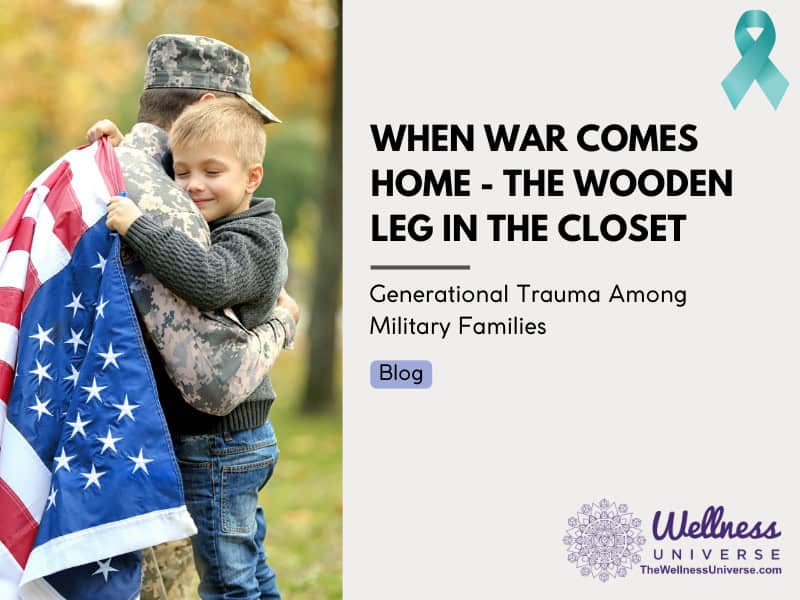Unspoken Echoes of War: The Hidden Legacy of Generational Trauma
By [Your Name]
In a quaint suburb where the laughter of children fills the air, the specter of history lingers—silent yet profound. For many, the 1940s and early ’50s may have been a golden era filled with family gatherings and celebrations. Yet, beneath the façade of familial joy lies a complex tapestry woven with threads of generational trauma from World War II—a conflict that claimed the lives of millions and left lasting scars on those who survived, and their descendants.
Jean Voice Dart, a psychotherapist with nearly fifty years of experience, reflects on her childhood as a "baby boomer," blissfully unaware of the weighty shadows cast by her family’s wartime past. With a father who served as a pilot and uncles who bore physical and emotional scars, Dart’s insights reveal how the remnants of war echo across generations, influencing emotions and behaviors in ways that often remain unspoken.
The Unseen Scars of War
World War II, the deadliest conflict in history, resulted in an estimated 70 to 85 million deaths. Civilian casualties alone exceeded those of military personnel, raising questions about the long-term impact of such immense loss. For families like Dart’s, the war was over before they were born, yet its legacy quietly permeated their lives in subtle, often unacknowledged ways.
Dart recalls the playful dares among siblings as they peeked into her uncle’s closet, where his wooden leg rested, a haunting reminder of the atrocities of war. “We giggled, daring each other to open the door and peek inside,” she writes. “That leg held stories no one could imagine.” Growing up in an environment where pain was rarely discussed, Dart and her cousins created their own narratives to fill the void left by their parents’ silence.
The Burden of Silence
For military families, especially those with veterans, discussing feelings related to trauma was—and still can be—a taboo. As Dart explains, her father’s addiction to cigarettes and his chronic migraines served more as symbols of unaddressed trauma than as mere health issues. “Health problems were seen as weaknesses to be avoided, contributing to a culture of silence where emotions were buried beneath duty and pride,” Dart notes.
Today, research underscores the prevalence of conditions like PTSD among military personnel, revealing that many veterans carried mental health burdens that were unrecognized during their service. Although the term "PTSD" wasn’t officially adopted until 1980, symptoms were common, affecting not only veterans themselves but also their families.
Growing Recognition and Resources
Recent years have seen a shift toward recognizing the necessity of addressing mental health in veteran communities, particularly concerning the phenomenon of generational trauma. Dart emphasizes that military families are now supported by a wealth of resources aimed at healing and understanding the impact of war on mental health and family dynamics.
Organizations like the Wounded Warrior Project and Tragedy Assistance Program for Survivors (TAPS) offer vital support, helping families navigate the emotional chaos and loss that accompany service-related trauma. Dart emphasizes the importance of storytelling and community as pathways to healing: “Sharing our stories is more than reflection; it’s reclamation—offering a way to process trauma and reconnect with our identities.”
Moving Forward
As Dart encourages surviving military families to initiate dialogues about grief, trauma, and loss, she also highlights the transformative power of embracing vulnerability. In her work as a therapist, she guides individuals to embrace and articulate their pain, helping them navigate the delicate balance between honor and sorrow.
“Today, surviving military families are no longer left to carry invisible weights in silence,” she reassures. “The power of community and accessible resources provides a lifeline, enabling families to heal together.”
As we grapple with the unspoken echoes of our past, it’s crucial to acknowledge that the journey of healing doesn’t end with active duty or war. The conversation about mental health, resilience, and family dynamics must continue—encouraging the next generation to not only recognize their heritage but to tackle it with open hearts and minds.
In this collective journey toward healing, families can reclaim their narratives, not just as legacies of trauma, but as stories of resilience, love, and hope moving forward. Dart’s powerful reflections serve as a poignant reminder that while the scars of war may run deep, the path to healing lies in speaking out, fostering connections, and nurturing communal growth.
Whether sharing stories in safe spaces, seeking support, or simply lending an ear to a loved one, we can collectively honor those who came before us while nurturing our journey toward mental wellness and understanding. Their experiences, couched in silence for decades, may yet be the catalyst for a brighter, more open future.
For support, individuals can reach out to resources such as the Wellness Universe and get involved with initiatives like the "Take My Hand Support Series," which provides community and guidance for military families facing grief and trauma. As Dart articulates, “Together, we are making a difference for future generations.”
In Summary
As we reflect on the past, it is not just a history lesson but an invitation to engage. Understanding generational trauma can empower families to navigate through their experiences with resilience and strength, transforming echoes of silence into narratives of healing and hope.
